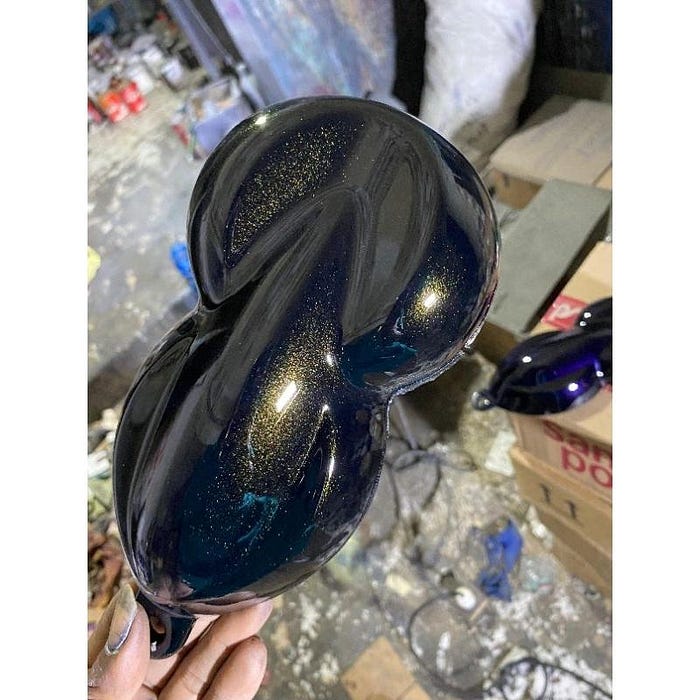The influence between Italy and Flanders can be seen in many paintings during the 15th and 16th centuries. There were several wealthy Italian merchants and bankers who commissioned paintings from the highly sought after Flemish artists.
Annunciation, Closed Frontispiece to the Portinari Triptych, Hugo van der Goes, c-1473-78
One such example is the famous Portinari Altarpiece, so named because it was commissioned by the Portinari family, which was painted by the Flemish painter Hugo van der Goes. Tommaso Portinari was a Florentine who worked for the Medici bank in the Flemish city of Bruges. Over a century earlier the famous author Dante Alighieri wrote The Divine Comedy and in it Beatrice Portinari was his guide through Heaven. Dante had loved Beatrice from afar since childhood and she became his muse after she had died young. Tommaso Portinari was a descendant from the same family.
The Portinari Altarpiece was created for the church of San Egidio in the hospital of Santa Maria Nuova in Florence and it is now in the Uffizi Gallery. This particular work is what is known as a triptych; an altarpiece having three panels, a central panel and two smaller side panels that fold together with hinges. When closed there is another image known as the frontispiece. A 15th century Flemish frontispiece was frequently painted using only shades of gray (known as grisaille). The image on the front corresponds to what is going on inside, here we have an Annunciation where the Angel Gabriel tells the Virgin Mary she is to be the mother of Christ. This grisaille frontispiece has the look of a marble sculptural relief.
Portinari Altarpiece Triptych, Hugo van der Goes, c-1473-78, Uffizi Gallery
The Portinari Altarpiece is extremely large, 8’3” x 9’8” (253 x 301 cm). The theme in the central panel is the Adoration of Christ. The Holy Family is shown in the manger at Bethlehem surrounded by animals and angels and joined by shepherds. Each side panel shows members of the Portinari family with their own patron saints. This is an absolutely beautiful work, startling in its realistic details and jewel-like colors. We will examine each of the three panels more closely.
Adoration of Christ, Central Panel of the Portinari Triptych, Hugo van der Goes, c-1473-78
In the central panel there are several objects with symbolic significance in addition to the principle figures at Christ’s birth. There are lilies in a vase that symbolize Mary’s virginity and purity, and the sheaf of wheat symbolizes the Last Supper. In a smaller vase there are seven flowers, seven was a common number in Medieval and Renaissance art. The Virgin had seven sorrows, there were seven sacraments, seven sins and seven virtues. Three was the number of the holy trinity and four was the number of man (man had four limbs, seasons, elements, stages of life, etc.) and the number seven also symbolized a joining of man and God. One removed their shoes typically as a symbol of respect and the shoe we see would show that this is now holy ground.
The colors in paintings from this era are also symbolic, Mary wears the traditional deep blue which was associated with her. Joseph wears a red robe, in Christian paintings red symbolizes the Blood and Passion of Christ. The lilies in the vase are red, white and blue which also tie into the symbolism of Holy Blood, purity and the color of the Virgin. If you look closely at the background of the central panel you can see that earlier the angels have announced the news to the same shepherds who are now worshiping Christ. This repeating of figures within a frame is known as continuous narrative and is seen throughout art history from Ancient times through the Renaissance.
Tommaso Portinari and sons with Sts. Thomas and Anthony, Left Panel,
Hugo van der Goes, c-1473-38
The Portinari’s had seven children and three of them are seen in the side panels along with their parents and their patron saints. It was very common in Flemish art for the patrons who commissioned the work to include themselves in it. Just as today when programs or events say “this was brought to you by” and list the individual or organization who paid for it, families or groups who paid for art were included in the artwork. Though they would be included in a very reverential way, praying to the saints or holy family. The family is split in two with the men on one side and the women on the other. Each saint also holds a symbol which would make them easily recognizable to the viewer. In the background we can see a very pregnant Mary with Joseph on the Flight into Egypt with a donkey, another example of continuous narrative.
Maria di Francesco Baroncelli and daughter with Sts. Mary Magdelene and Margaret,
Right Panel, Hugo van der Goes, c-1473-78
On the right side we see Tommaso’s wife and daughter with St. Margaret (trampling a dragon) and St. Mary Magdalene (with a jar of ointment) and in the background we can see the three Magi on their way. Notice the hairline of all the women in the painting, it looks like an error but in fact it was the style at the time in Flanders for a woman to pluck back her hairline and have a very high forehead.
Besides the fact that this painting is over life-size, we can tell it was a very valuable painting by the colors that were used. Pigments that were earth tones were easy to find in rocks, clay and wood. But the bright reds, blues and greens came from more expensive precious and semi-precious stones which were ground up. The Portinari Altarpiece has nearly every color imaginable used in it and its size and level of detail took the artist several years to paint. This work is truly one of the highlights of the Flemish Renaissance.





.jpg)


